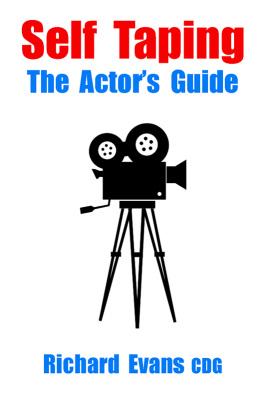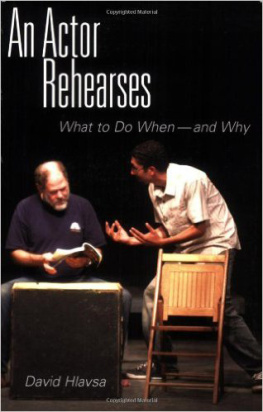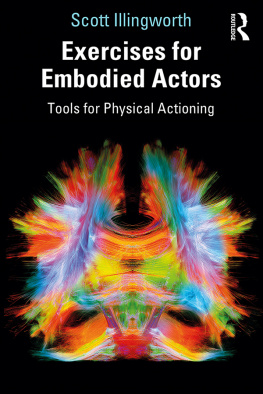Richard Evans CDG - Self Taping: The Actors Guide
Here you can read online Richard Evans CDG - Self Taping: The Actors Guide full text of the book (entire story) in english for free. Download pdf and epub, get meaning, cover and reviews about this ebook. year: 2014, publisher: eBookPartnership.com, genre: Home and family. Description of the work, (preface) as well as reviews are available. Best literature library LitArk.com created for fans of good reading and offers a wide selection of genres:
Romance novel
Science fiction
Adventure
Detective
Science
History
Home and family
Prose
Art
Politics
Computer
Non-fiction
Religion
Business
Children
Humor
Choose a favorite category and find really read worthwhile books. Enjoy immersion in the world of imagination, feel the emotions of the characters or learn something new for yourself, make an fascinating discovery.
- Book:Self Taping: The Actors Guide
- Author:
- Publisher:eBookPartnership.com
- Genre:
- Year:2014
- Rating:3 / 5
- Favourites:Add to favourites
- Your mark:
- 60
- 1
- 2
- 3
- 4
- 5
Self Taping: The Actors Guide: summary, description and annotation
We offer to read an annotation, description, summary or preface (depends on what the author of the book "Self Taping: The Actors Guide" wrote himself). If you haven't found the necessary information about the book — write in the comments, we will try to find it.
Self Taping: The Actors Guide — read online for free the complete book (whole text) full work
Below is the text of the book, divided by pages. System saving the place of the last page read, allows you to conveniently read the book "Self Taping: The Actors Guide" online for free, without having to search again every time where you left off. Put a bookmark, and you can go to the page where you finished reading at any time.
Font size:
Interval:
Bookmark:
Richard Evans 2014
Richard Evans has asserted his rights in accordance with the Copyright, Designs and Patents Act 1988 to be identified as the author of this work.
Published by eBookPartnership.com
First published in eBook format in 2014
ISBN: 978-1-78301-429-3
All rights reserved under International and Pan-American Copyright Conventions. By payment of the required fees, you have been granted the non-exclusive, non-transferable right to access and read the text of this e-book on-screen. No part of this text may be reproduced, transmitted, downloaded, decompiled, reverse-engineered, or stored in or introduced into any information storage and retrieval system, in any form or by any means, whether electronic or mechanical, now known or hereinafter invented, without the express written permission of the Publisher.
eBook Conversion by www.ebookpartnership.com
We have all heard of the phenomenon of the selfie, a practice involving taking photographs of yourself in an interesting location or with other, sometimes famous people, using your camera phone and usually posting them on social media sites. However, it may surprise you to know that there is a form of selfie that is becoming more and more common and necessary as a career tool for actors and performers. This is known as self taping and, as the name implies, it involves you doing an audition on camera, filmed in your own home, rather than a casting suite or studio, maybe being your own camera person, and getting the finished product to the company that has requested it.
So, why do we have to do all this work instead of just turning up for a casting? While some people might think this a lazy, even cheapskate way of doing things as the production company will be saving money on hiring an expensive casting suite and extra staff by putting the onus on you it can also have some useful advantages to the actor concerned.
The main advantage of self taping over physically going to a casting or audition at a designated time, is that it will save you time and money, especially if the production in question is being cast or produced in a different city, or even country, from where you are based or happen to be. Another distinct plus in favour of the DIY route is, depending on the timescale involved, everything can be done at your own pace and at a time that suits you, rather than having to turn up at an allotted time on a specific day. It can also mean that you have more time to learn the script and get the filming just right, doing take after take until youre happy with the finished product, if necessary (a luxury you will rarely, if ever be afforded in a casting suite, where time is money, as most cost over 100 an hour to hire).
On the other side of the coin, the major disadvantage of filming yourself is that you will have no direction, as you would if you were in an organised casting with one or more members of the creative team at the helm. The first few times any actor is asked to self tape can be daunting, perhaps even terrifying. Where do I start? Will the quality be good enough?, Have I got it right? and I could never do that! are all common reactions from anyone whose technical knowledge is limited.
This book gives you a step-by-step guide enabling you to achieve what the casting directors, directors and producers will want to see and taking the fear out of this ever-increasing method of casting. So read on, start learning and lets get taping!
Being asked to self tape, like any audition in a building, is usually done by invitation. You might get approached by a production company or casting director about a specific role in a production which they are casting, or get a call or e-mail from your agent giving you the appointment and telling you what is required. Sometimes there will be a very specific brief, at others there will be little or no brief, just a few script pages (and perhaps minimal character description), so be prepared. Always try to find out as much information as you can from the person who sent you the details or sides, especially if not enough is given to help you make decisions about the delivery and character you are playing.
The majority of self taping, at the moment, is requested for productions which will be filmed, such as movies, television drama, corporate videos and commercials. If you are invited to audition for a play or musical in the theatre, yet are far away from the place where the audition is scheduled to be, you could ask the casting director or production office if you can self tape your audition, or ask your agent to do so. The answer to this will probably be negative, as the creative team will have arranged their auditions and will usually want to see you live and in a room (several times if you are recalled or called back), as this is, and always has been, the norm. However, even in theatre times are changing and there is a casting information service to which you can subscribe which enables those responsible for casting to circulate a breakdown to actors and agents and request a taped audition in response. This might be reading from some script pages that have been provided, performing a speech or even singing a song to a pre-recorded backing track. This service is The Stage Castings ( http://castings.thestage.co.uk ), created and run by the UKs oldest and most respected entertainment newspaper, The Stage. This software is very useful, and, as with all groundbreaking ideas, it may well be emulated by other companies in time to come, but responding to the breakdowns that are posted is an excellent way to start and practice self taping, while possibly getting yourself a job in the process. Keep in mind, however, that most of these tapes are only used for preliminary casting and if the creative team like what they see, you may well have to travel and meet them in person before getting offered the job.
The first thing to consider whenever youre asked to self tape is the amount of time you have been given to prepare, shoot your audition, edit the footage and send the finished material to the person or company concerned. The timeframe for doing this might be quite generous, as much as a week, but if their deadlines are tight you may only have a day or two, or even a matter of a few hours, so it really pays to be prepared for this eventuality and plan exactly how youre going to film your audition whenever the need arises. A deadline should be included in the e-mail you are sent by your agent or the production company with the details of the self tape, but if no timings are mentioned ask whoever has sent the material when they need the finished product. If, however, you cannot get a definite answer, assume the timeframe is very short and set to work on your tape immediately it will certainly do you no harm.
Next, read and reread the brief that you have been sent to ensure you understand everything that is required of you (if you dont understand anything then dont be afraid to ask). Think about the brief, what those watching your audition will need to see and how to put it into action most effectively. Have they sent you script pages (sides) to prepare for your audition, have they requested speeches, improvisation or do they just want to see how you look on camera? How many scenes are they expecting you to deliver? If the timeframe allows (and even if it does not), learn this material as soon as you receive the pages, preferably memorising it wherever possible so you are off the page and DLP (dead letter perfect). By this, I mean learning the words exactly as they are written on the page, without substituting words for others which you may think more suitable, altering their order or paraphrasing the text. This is essential for two very good reasons: first, scripts are timed meticulously with a stopwatch (especially in the medium of television so that an episode will run exactly to the time that has been scheduled for its broadcast), so any word additions, subtractions, overly long pauses or fast or slow delivery will mess up these timings and involve lots of extra editing. The second reason is that the writer of the piece may be part of the decision-making process, or present if you are called in for a follow-up audition as a result of your self tape, and many writers are precious about their dialogue, so they may go against you if you make alterations to the lines they have written. If you need to have the script pages there for backup, prop them up off camera and make sure that the type is printed in a size that you can read easily, without having to squint at the script. You may be sent several short scenes (8 or 10 is not uncommon) and asked to do them all. If there is really not enough time to learn them, ensure you have a good idea of them in your mind, so that you can perform for the camera rather than reading off the page. Performing the scenes sitting on a chair or stool, rather than standing up will make you feel more relaxed, especially if you have to go for several takes on each scene.
Font size:
Interval:
Bookmark:
Similar books «Self Taping: The Actors Guide»
Look at similar books to Self Taping: The Actors Guide. We have selected literature similar in name and meaning in the hope of providing readers with more options to find new, interesting, not yet read works.
Discussion, reviews of the book Self Taping: The Actors Guide and just readers' own opinions. Leave your comments, write what you think about the work, its meaning or the main characters. Specify what exactly you liked and what you didn't like, and why you think so.








